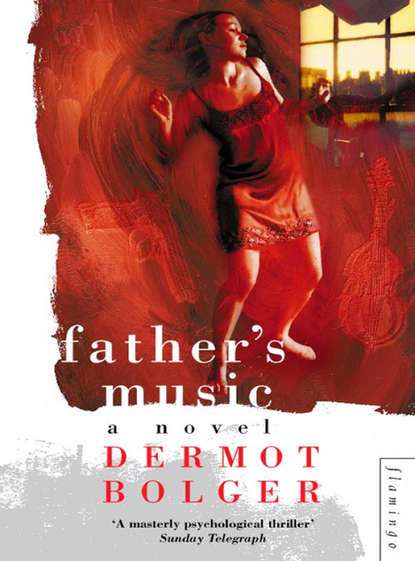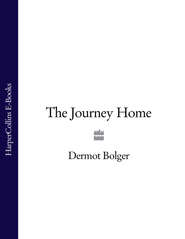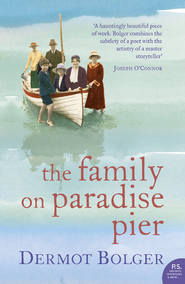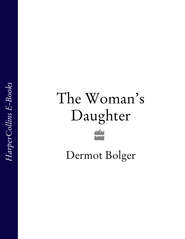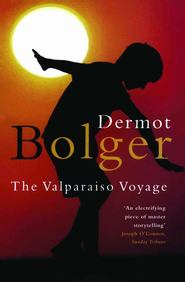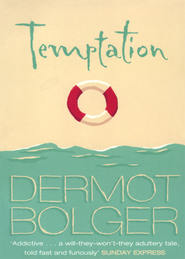По всем вопросам обращайтесь на: info@litportal.ru
(©) 2003-2024.
✖
Father’s Music
Автор
Год написания книги
2018
Настройки чтения
Размер шрифта
Высота строк
Поля
‘The Ice-Man?’ Luke laughed. ‘That sells papers but Christy can hardly tie his shoe-laces. He’s no saint, but if he’s a gang lord why hasn’t he two shillings to rub together? I’m not defending him, but he’s your ordinary decent small-time crook. Nobody in the crime world takes him seriously, but he’s got a big mouth and papers like that. Two of our uncles were famous hard men. A family is like an area, once it gets a reputation the truth doesn’t matter. Real criminals keep their heads down, they like it that way. And they’re only trotting behind the the big scams in fraud by accountants. But that’s not sexy enough, newspapers need bogeymen with half-arsed nicknames.’
He was quiet as a new tune began. ‘The Blackbird,’ he said. ‘Listen, it’s my favourite set dance.’
I was happy not to talk. We’d reached an equilibrium, a wary trust that was as far as we were willing to commit. I closed my eyes, immersed in that lilting tune. It suited the night we drove through, these deserted streets which, in a few hours, would be thronged with every race. We were strangers, separately caught up in the music and wild applause and stamping boots when it finished. Another tune began, with a frighteningly raw sense of abandonment. It was the first time I’d ever felt high on music alone. When I glanced at Luke I felt his sense of isolation.
‘Do your children like this music?’ I asked.
‘It’s not their fault,’ he said. ‘Basically by now they’re English. They’d say they’re Irish and their pals call them Irish, but in Dublin they’re seen as English and rightly so.’
‘I’m English,’ I said, ‘and I like it.’
‘But you’re not running away from it.’
‘How old are they?’
‘I’ve a lad of four,’ he said. ‘The other two are older, almost your age if you must know.’
‘What are they like?’
‘Let’s say it was different when they were younger.’
‘What’s your wife’s name?’
‘Just stop it right fucking there.’ Luke pressed the eject button and the tape slid out, filling the car with static. ‘Two weeks ago I wanted a ride, not a social worker.’
I stared away, hurt. But maybe it was all he had wanted and all I’d wanted too, or allowed myself to want. Was I not just trying to ease my conscience now? Questions wouldn’t change the fact that I’d screwed a married man. We had been a diversion from stale lives. Because that’s what my life was, hysterical laughter in clubs only hid its hollowness. I wanted something more, but not a steady job or boy-friend. I wanted excitement. I wanted Luke’s brother to be ‘The Ice-man’. I wanted to fuck whoever I wanted, with me deciding what was right or wrong.
Luke seemed tense as he parked at a row of shops. No one was about and I grew nervous. Last week I had fled from a youth in a lane, vowing never to walk myself into trouble again. Luke got out, producing keys as he bent to pull a steel shutter up. The shop was called AAAssorted Tiles.
‘Do you want marks for spelling and originality?’ I asked.
He turned off the alarm and opened the glass door.
‘It’s first in the Yellow Pages,’ he said, ‘should you care to look.’
Once inside he pulled the shutter partly down and switched on one set of lights so that half the store lay in shadow. I walked along the display units, fingering tiles and listening to him list the countries they were from. There was something soothing in his tone. There was a beautiful jade tile from India on a shelf. I pocketed it.
‘That’s stealing,’ he said.
‘You can’t talk.’
Luke smiled, remembering the panties. He walked to the counter and switched the light off. I gripped the tile, wary now. But he just opened the glass door and pulled the shutter up so I could see him clearly in the street light. He turned.
‘What you see is what you get,’ he said.
‘No Godfather, no master criminal.’
‘We don’t pick our families,’ Luke replied. ‘We can’t give them back either. But we can make lives away from them. Who are your family?’
‘I don’t have one,’ I said.
He stared at my face, as though trying to make me reveal more.
‘Everyone has one. In the end that’s all we have.’
‘My parents are dead,’ I said.
‘I don’t even know your name.’
‘Tracey.’
‘What you see, Tracey, is what you get. I’m hiding nothing or making no promises I can’t keep. But I swear I’ll never lie to you. Monday to Saturday I work here for my family. Sunday is my own. Next Sunday I can arrange to get that room. I can’t arrange for you to be there. I’ll leave you at a tube station now. Don’t give me an answer. I just want you to know that I’ll be waiting should you decide to come.’
SIX (#ulink_46de66fb-fabd-58a1-be70-f6065ac9ce89)
THE BEST WAY TO HIDE something, according to Luke, was to lay yourself so open that people forgot there was anything to hide. Enter any bar in overalls at closing time and you could walk off with the television, the slot machine or the very seats people sat on. The one place where people never saw things happen was under their noses.
That’s why I was wrong at fourteen to hide those initial cuts on my arms. Nobody might have noticed or I could have passed them off as an accident at school. If they hadn’t congealed into a secret, the habit might have lapsed and I would never have grown addicted to the sense of control it gave.
Control was something I’d never known in that house. Even Grandad Pete acquiesced to Gran without comment. Only my mother argued and, even then, half-heartedly, knowing she would be brow-beaten. Nothing could deflect Gran from her second chance to rear a success. At sixteen I was to pass my GCSEs and get into Saint David’s, the best sixth-form in Harrow. National Savings Certs were waiting to be cashed two years after that, when I would enter university, with every penny calculated so that nothing might distract me from my studies there. When Gran asked would I like to study science it wasn’t a question. I had the brains and it was where I might meet a successful prospective husband.
When mother argued that my teachers at Hillside High said I had a gift for English, Gran scoffed at the notion of an Arts degree. That was a catch-all for unambitious people with fuzzy brains and, besides, what would my mother know, having barely scraped through North London Poly before getting herself pregnant. It was a barb used to end all arguments. Mother retreated into silence like a beaten dog and I bent over my homework as if French verbs and equations were a precise world I could lose myself within.
I sometimes wondered about what life my mother might have led if I hadn’t been born, although, even then, I understood that it would never have been a stable one. She was too insecure, rearranging the most simple things until they fell apart in her hands. My father would probably have abandoned her anyway, but without the burden of me, she might have found a niche with someone decent who would lend her confidence. She had become attached to fellow patients in hospital, but whenever she was discharged Gran severed the contact, claiming my mother’s manic depression couldn’t be cured if she was perpetually reminded of it.
Occasionally I saw flushes of devil-may-care mischief in her: out shopping she might drag me into the pictures when we were due home. She’d take my hand and I’d glance at her face, wondering at what life might be like if she could break free of Gran. Only twice had she tried to do so: hitch-hiking around Ireland the summer before I was born and then plotting that disastrous holiday when I was eleven, during which she was blamed for losing me. I never talked about what happened on that trip and they learned not to question me, but for years those memories were still raw, if dormant, for us all.
Even without such tension, fourteen would never have been an easy age. It was a time of half-knowing everything, of self-consciousness, self-questioning and self-hatred. I nicknamed myself Burst Rubber, thrilling in its obscenity. I couldn’t stop visualising my own conception, from blue videos seen in friends’ houses and the magazines Joan Pitman’s brother had, which we found and shrieked with laughter at. There were no faces in the images in my mind, just two torsos – one white-bellied, the other shrouded with greying hair – and the sweating threadbare leather of a car in some Irish bog. The image kept recurring, even in school, a stumpy unwashed penis jutting in and out as the rubber snaps and gathers at the base among ancient curls. Still they rut on, oblivious to my fate passing between them, a fugitive seed meant to have been flung into a ditch, a tadpole struggling upstream to blight that white-bellied Englishwoman’s life.
I knew this was a self-loathing fantasy. Frank Sweeney had married my mother in Dublin, so presumably they once imagined some sort of life together. He had even briefly stayed in Harrow. But there was a collective amnesia about any mention of him.
That year I smoked every day after school with the girls in Cunningham Park as we eyed the lads who passed from the swings. Four of us drank a stolen bottle of vodka and myself and a girl called Clare Ashworth vomited into somebody’s garden on Devonshire Road. We drank cider in Headstone Cemetery with rough boys from Burnt Oak and Clare and I competed to see who could snog with them the longest in public. We dared each other to steal things we didn’t want from shops across from Harrow-on-the-Hill station. We skipped school to party, with curtains drawn and a red bulb in Clare’s living room when her parents were at work. Once we ran off in our skimpiest clothes to keep a vigil on a frozen night outside the recording studio where our favourite band was incorrectly rumoured to be and Clare took me home when I became hysterical for no apparent reason as we camped down in the graffiti-covered wall laneway.
One Saturday we had our noses pierced against our parents’ consent. On the train home we loudly pretended that our clitoris had been pierced, to embarrass the blushing geek who sat with his legs crossed in the next seat. After he left, we wondered more quietly if it really caused climaxes to last an extra twenty seconds, like Joan Pitman’s big sister said, or was she just a cow making it up. Afterwards I walked home with Clare. With the others gone we could stop pretending we weren’t scared. I kept a bandage over my nose all evening until Gran grew suspicious. When she pulled it off I broke down in tears.
Outside of home there was no public rebellion I couldn’t shame her with, but once inside the front door I was shrunk into being a child again as Gran railed against me wanting to rip my jeans or have my hair cropped. She controlled my appearance as carefully as every other aspect of my life. I was afraid to ask about any secrets they kept from me, and ashamed, in turn, to tell them the secrets which I had buried inside me.
Gran’s shame about my origins was bred into me. I told friends I had no idea who my father was. If they pressed, I said that all my mother remembered was that he was strong, white and French – or at least the wine he’d plied her with had been. In truth, all I possessed was his name on my birth certificate and all I knew for certain was that my cauled head and first cries had splintered their unlikely marriage apart. Sweeney had been fifty-nine when he met my mother who was twenty-two. He had abandoned us like Gran always claimed he would, within months of coming to Harrow. Callous, ignorant and selfish, he had been a man who would sooner play music then wash himself. A man who walked away at the first hint of responsibility, leaving his tainted blood coursing through my veins like an infection to be constantly watched.
In my mind I become fourteen again on that sleepless night when the addiction began. I have lain awake for hours, listening to droning voices argue about me downstairs, until I hear my mother’s defeated tread and her door close. I feel I can smell cigarette smoke in her room, the first of the dozen butts to be crumpled like spent cartridges in her bedside ashtray by dawn in her one act of defiance. Soon Gran will come up and check for the reassuring flash of the smoke alarm on the landing.
I am marooned by insomnia, almost physically feeling my body curve into new, unwanted shapes. Everything feels strange, except the sense of being a pawn between them. The house settles down with each of us awake, reliving the latest fight over my behaviour. They cannot understand this change. For years my reports were excellent, the perfect bright pupil, frighteningly articulate when not quiet as a doll in class. Now I know Gran is suggesting another school, still convinced that my behaviour is caused by bad influences. Nothing will be said but I’ll count the butts by my mother’s bedside and know that Gran won.
The radiator contracts with a sullen metallic groan. I am terrified the curtains are not closed properly and I’ll wake to find the moon’s face prying in on me. I hate myself for such a stupid fear, but even thinking about the moon brings those memories back. I play the game where it happened to someone else, but that doesn’t work. I can remember too much, the slanting church roof, the stink of his flesh. I’m a cow for allowing these memories back. My nails dig into my palms. My skin crawls with pent-up tension. Tomorrow my period is due, an unwanted novelty that has worn thin. I turn over, pressing my head into the pillow. My scream is so loud in my mind that I think they will hear. I breathe in the suffocating darkness of the pillow and lift my hands above my head but when I bring them down it is not the roots of my hair they tug at. I know whose hair it is. I have stared at her curls in the photograph on the sitting room wall. That 1960s schoolgirl smiling under her blue beret, surrounded by classmates who’ve swapped hippy beads for overweight husbands in Northwood and Kensington.
I want to scream that I am not my mother, but I cannot feel any sense of myself. I lie like a crumpled puppet, choked by everyone’s need for a second chance. I have felt disembodied once before, after taking pills Clare had found. But the way my body rocks in the bed is more frightening. I twist my head, desperate for comfort, and screw my eyes shut. Other eyes, huge and unblinking, watch from the blurred after-image invading the darkness beyond my eyes: the eyes of the Man in the Moon. They change to those of a fly, triangular legs and twitching limbs tussled in a spider’s web. I’m going mad, like my mother. I want to cry for help like a child. But I am fourteen, with buds of breasts and the downiest of hair and the weight of expectations like a skin hardening over mine.
There is a shard of pain as some hair comes loose. I grimace and let go, my knuckles intertwining above my head, fingers clawing against fingers. A fragment of fingernail peels away. It just happens with a sharp incision of pain. I gasp. The nail hangs, jagged and half broken off. I press it across my wrist and squeeze my face into the pillow, too shocked to feel pain or cry out. What I feel is a flush of revenge. I am damaged goods if I could only tell them. Now I am soiling this replica schoolgirl they’ve tried to create. But suddenly it hurt and aches more as I keep scratching till my arm is a mass of scars.





